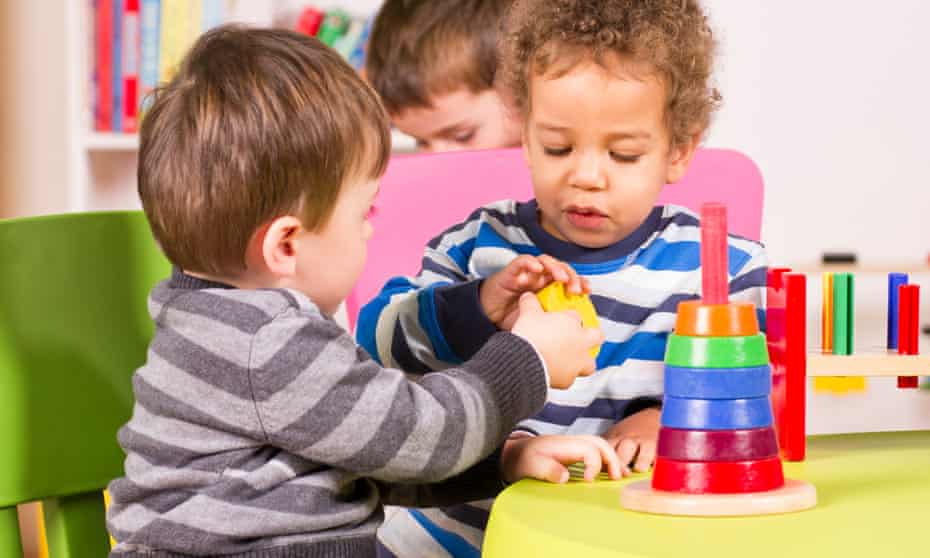How do I make friends so my son has playmates?

Be curious for your own sake about friendship, says Philippa Perry. You may have mild autism or something in your childhood may have made you defensive
The question I am a 32-year-old mum of a happy baby. I love him and I’m enjoying being on maternity leave. My husband is a lovely man who adores being a dad.
We have nice friends, but they are friends my husband has made. I go to the baby groups and I chat to people, but how do you actually make friends with someone? I was hoping our antenatal group would be a good place to make new friends, but it is a bit cliquey – it felt like being back in school. It felt competitive and we don’t have much money for all the baby accessories, activities and classes. We went to a barbecue at one mum’s house and it was a mansion and I’m embarrassed that our house is rented and small.
People have commented in the past that they don’t know me, or it’s a shame they never got to know me. At university, I focused on academic work rather than hanging out with people. Have I got some kind of undiagnosed problem? I’m worried that if I don’t get into a group of mum friends, it will start to affect my child because he won’t make toddler friends or go on play dates and I want to give him every chance of happiness.
Philippa’s answer First, you can do relationships because you seem to have two good ones – with your baby and your husband. And you like his friends. It is quite possible you have mild autism, which may mean that bonding easily with people outside your immediate family doesn’t seem to happen easily. And you do seem to prefer your own company rather than seeking out others. If you feel it is a problem you could go to your GP and ask for an autism assessment. A diagnosis of autism may help you access therapy or support groups.
One doesn’t usually make good friends based on the size of the their house or how many baby accessories they have. I think spending time alone at university was probably a preference for you, rather than a need to study all the time. You talk about the mums’ group being cliquey. That is the nature of all humans. Within a group, subgroups naturally form. In any school, any workplace, social group, and in large families, people will form subgroups. This isn’t a bad thing or a good thing, it’s just normal human behaviour. Getting closer to a person or a couple of people means a subgroup forms.
Mild autism may be the reason you are finding making friends difficult, but there might be other reasons. We can unconsciously develop strategies of how to be in the world in response to our early environment. Then the defences that helped us before become a hindrance and hold us back in new environments. What was self-preserving can become self-sabotaging. It could be that at some point during your development – perhaps at school, perhaps even before school – something was happening that made you, consciously or unconsciously, decide you were better off not making friends and you could manage without. I notice that, in your mind, the mums become the same schoolchildren who may once have excluded you. And yet you have been invited to the barbecue and it is you who is ruling the mum out because her house is too big. I wonder if you prefer your own company to that of other people and then try to rationalise it.
READ RELATED: My partner will only have sex with me if I wear stockings and high heels
Part of the problem is that you want to make friends for your son’s sake rather than for your own. I don’t know if it’s possible to form genuine connections and alliances if you are not doing it for the enjoyment and sense of kinship for yourself. Others have said it’s a shame they had not got to know you, but you don’t say whether this made you sad, too. Your son’s relationship with you and your husband will be more of a blueprint for his subsequent relationships than your relationships to your peers – so don’t worry on his behalf, he’ll make his friends at nursery. It is for your own sake that you can be curious about why you might be difficult to get to know.
What can get in the way of connecting can be anxiety about how we come across. A way of circumnavigating that feeling is to supplant it by being interested instead in the person we’ve met. This means shifting your focus away from self-consciousness and towards them. When we manage this, it becomes easier to be delighted in someone rather than drained by them.
You can meet people and chat to them, but the real business of friendship happens after that, when you use your courage to open yourself up, share your vulnerabilities and take care of other people when they open up to you. I expect you have shared on this level with your husband and, if so, you can with others, too.
Recommended reading: What Do You Say After You Say Hello? by Eric Berne – this is about learning what adaptations you may unconsciously have built up throughout your life and how much easier it is to connect after we have let these defences go.
Don’t worry too much; one small step at a time. Concentrate on enjoying yourself, your family and your maternity leave.
If you have a question, send a brief email to [email protected]
Source: Health & wellbeing | The Guardian





